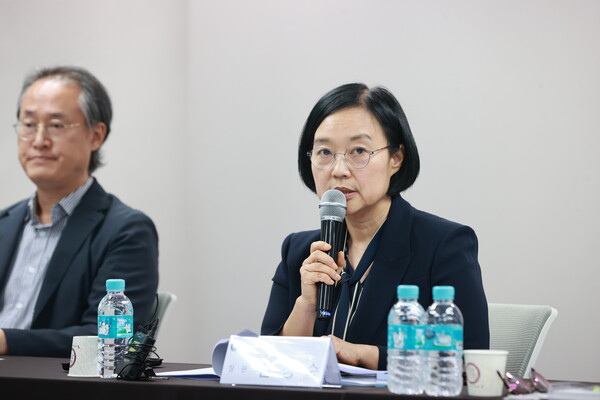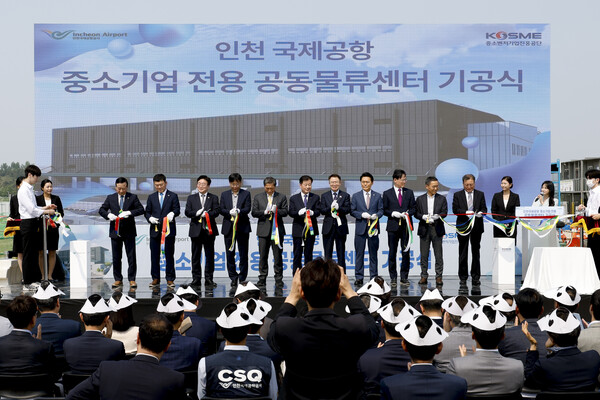Minister Han Sung-sook unveils plan to build a full-cycle export ecosystem—linking online trade, logistics, and IP protection for ‘K-brand’ growth

The Ministry of SMEs and Startups (MSS) announced a comprehensive plan to accelerate the global expansion of Korean small and medium-sized enterprises (SMEs) through the development of dedicated “K-product platforms” and enhanced logistics, customs, and intellectual property protection. The initiative aims to strengthen Korea’s digital trade competitiveness amid rapid changes in global e-commerce and evolving customs environments.
Minister Han Sung-sook presented the “SME Online Export Promotion Strategy” during a meeting held at the Korea Post International Postal Logistics Center at Incheon International Airport on November 12. The announcement reflects the government’s commitment to expanding Korea’s economic footprint through online exports and fostering next-generation growth in the digital economy.
“This plan is about building the infrastructure for small businesses to compete directly in the global marketplace,” said Minister Han. “We’ll make sure these measures are implemented swiftly and effectively so companies can feel the impact on the ground.”
The MSS plans to identify and support domestic online platforms with high market potential and innovation capacity, including startups recognized through private-sector initiatives such as TIPS and Pre-Unicorn programs.
Selected platforms will receive financial support of up to 1 billion won each for overseas market analysis, rebranding, global marketing, and establishing foreign subsidiaries.
The ministry will particularly focus on emerging markets—including Latin America—and specialized platforms featuring K-pop merchandise, lifestyle goods, and interior design products that reflect the global popularity of Korean culture.
A collaborative model between SMEs and online platforms will be introduced. Under this model, private-sector experts will identify promising companies, while the government subsidizes marketing and listing costs. Participating platforms will offer reduced commission fees, promotional events, and training programs to help SMEs grow.
The existing GoBizKOREA portal, operated by the ministry, will be expanded into a comprehensive online export management platform. It will enable companies to apply for programs, track applications, and access real-time export support information, all in one place. The platform will also integrate logistics application and management services through partnerships with private logistics providers.
To further enhance global competitiveness, the MSS will designate “K-online export strategic items”—top-performing domestic products identified through contests, festivals, and retail success data.
A new online export voucher program will provide flexible financial support for activities such as market research, overseas marketing, platform onboarding, product certification, and logistics.
The ministry will also launch localization consulting services, helping companies meet foreign regulatory standards on ingredients, labeling, and packaging.
For firms transitioning from online to offline sales, the government will introduce a “One-Click Package for First Offline Exports,” offering bundled support for consulting, logistics, and brand marketing.
The plan includes robust institutional support for logistics, customs, and intellectual property.
Starting in 2026, a dedicated e-commerce export logistics voucher program will offer 15–30% discounts on international express (EMS) services. The ministry will also collaborate with private logistics firms such as Samsung SDS to secure dedicated cargo space, ensuring faster and cheaper delivery for exporters.
The Smart Trade Hub, a dedicated air logistics center for SMEs currently under construction at Incheon International Airport, will begin operations in late 2026. Additional SME logistics hubs will be established at major ports including Busan and Incheon, while overseas logistics centers in Los Angeles and other regions will expand support for K-beauty and lifestyle brands.
Meanwhile, the Korea Customs Service will simplify export declaration systems, broaden simplified export eligibility, and streamline re-import procedures for returned goods. To protect exporters from counterfeiting, the government will establish a “K-Brand IP Protection Council” to coordinate anti-piracy efforts across relevant agencies.
Minister Han emphasized that the initiative is part of a larger vision to position Korea as a “digital export powerhouse.”
“This is not just a policy,” she said. “It’s a roadmap for transforming our SMEs into global players by connecting innovation, logistics, and branding under one ecosystem.”
The government aims to advance public-private partnerships and reach one million online-exporting SMEs, reinforcing the nation’s role as a leader in global e-commerce and digital trade.


